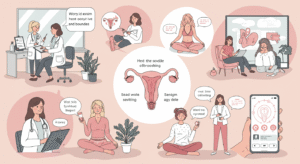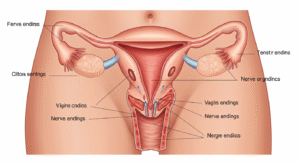In recent years, discussions around sexual desire have gained prominence, shedding light on the complexities surrounding women’s libido. A common concern among women is low sexual desire, often referred to as low libido. This issue can stem from various factors, one of the most significant being stress. Understanding the connection between stress and low desire in women is essential not only for women seeking solutions but also for partners and healthcare providers aiming to support their well-being.
Defining Low Desire and Low Libido in Women
Low desire in women encompasses a range of experiences where women feel a diminished interest in sexual activities. While sexual desire naturally fluctuates throughout a woman’s life due to hormonal changes, relationship dynamics, and individual experiences, persistent low libido may be cause for concern. This condition can affect a woman’s relationships, self-esteem, and overall quality of life.
Low libido is not simply a matter of lack of interest; it can be tied to emotional, psychological, and physical health. As such, understanding the nuances of low desire in women requires a holistic approach that considers various contributing factors, including stress.
The Impact of Stress on Women’s Sexual Desire
Stress is an inevitable part of life, but chronic stress can have detrimental effects on mental and physical health. For women, high-stress levels can lead to significant changes in libido. The body’s response to stress involves the release of hormones like cortisol and adrenaline, which prepare the body to react to perceived threats. While this response can be beneficial in short bursts, prolonged exposure to stress can disrupt the delicate balance of hormones responsible for sexual desire.
- Hormonal Imbalance: Chronic stress can lead to hormonal imbalances that affect sexual desire. Increased cortisol levels can inhibit the production of sex hormones such as estrogen and testosterone, which are crucial for a healthy libido. This hormonal disruption can lead to decreased sexual arousal and satisfaction.
- Mental Health Issues: Stress is often a precursor to mental health issues such as anxiety and depression, both of which can significantly impact sexual desire. Women experiencing anxiety may find it challenging to engage in sexual activities due to worries about performance, body image, or relationship dynamics. Similarly, depression can lead to a loss of interest in activities that were once enjoyable, including sexual intimacy.
- Fatigue and Exhaustion: Stress often manifests physically, leading to fatigue and exhaustion. When women are mentally and physically drained, the likelihood of feeling sexual desire diminishes. The desire for intimacy requires energy and emotional availability, both of which can be depleted by ongoing stress.
- Relationship Strain: Stress can strain relationships, causing communication breakdowns and emotional distance between partners. When couples are not emotionally connected, sexual desire may wane. If stressors like work pressures, parenting responsibilities, or financial concerns dominate conversations, intimacy can take a backseat, further exacerbating low libido.
Identifying the Sources of Stress
To address the connection between stress and low desire in women, it is essential to identify the sources of stress in their lives. Some common stressors include:
- Work-Related Stress: Balancing job responsibilities, meeting deadlines, and navigating workplace dynamics can contribute significantly to stress levels. Women may also experience additional pressures related to gender roles and expectations in the workplace.
- Family and Parenting Responsibilities: The demands of caregiving, whether for children or aging parents, can lead to emotional and physical exhaustion. Women often juggle multiple roles, and the weight of these responsibilities can diminish their energy for intimacy.
- Health Concerns: Personal health issues or concerns about the health of loved ones can be significant stressors. Chronic illness, reproductive health issues, or the aging process can all impact a woman’s sexual desire.
- Financial Pressures: Economic stressors can create a pervasive sense of anxiety. Concerns about job security, debt, or financial stability can overshadow other aspects of life, including sexual intimacy.
Strategies to Alleviate Stress and Enhance Sexual Desire
Addressing stress is crucial for improving sexual desire in women. Here are some effective strategies:
- Mindfulness and Relaxation Techniques: Practicing mindfulness through meditation, yoga, or deep-breathing exercises can help manage stress levels. These techniques promote relaxation, allowing women to connect with their bodies and enhance their overall sense of well-being.
- Open Communication: Encouraging open communication between partners about feelings, desires, and stressors is vital. Discussing concerns can foster emotional intimacy and help partners support each other in navigating challenges, leading to increased sexual desire.
- Regular Exercise: Physical activity is a powerful stress-reliever. Engaging in regular exercise releases endorphins, which can improve mood and enhance libido. Finding enjoyable activities, whether it’s dancing, swimming, or hiking, can make exercise a fun way to reduce stress.
- Prioritizing Self-Care: Women must prioritize self-care to maintain their physical and emotional health. Taking time for hobbies, relaxation, or pampering can create a more balanced life, fostering a sense of empowerment and enhancing sexual desire.
- Seeking Professional Help: If stress and low libido persist, seeking professional help from a therapist or healthcare provider may be beneficial. Therapists can help address underlying mental health issues, while healthcare providers can explore hormonal imbalances or other medical conditions that may contribute to low desire.
The Role of Lifestyle Changes
In addition to stress management techniques, making lifestyle changes can positively impact women’s sexual desire. Here are a few recommendations:
- Balanced Nutrition: A nutritious diet supports overall health and hormonal balance. Foods rich in omega-3 fatty acids, antioxidants, and vitamins can enhance energy levels and improve mood, promoting a healthier libido.
- Limiting Alcohol and Caffeine: While moderate consumption may not have significant negative effects, excessive alcohol and caffeine can exacerbate stress and contribute to low libido. Women should be mindful of their intake and consider moderation.
- Adequate Sleep: Sleep is crucial for mental and physical recovery. Prioritizing quality sleep can help alleviate stress and boost overall well-being, leading to an improved sexual desire.
Cultivating a Supportive Environment
Creating a supportive environment can significantly impact women’s ability to manage stress and enhance sexual desire. This includes:
- Partner Support: Partners should work together to create an environment of understanding and compassion. Supporting each other through stressful times can strengthen emotional bonds and rekindle intimacy.
- Community Engagement: Engaging with supportive friends or community groups can provide a sense of belonging and relief from stress. Sharing experiences and seeking advice from others can alleviate feelings of isolation.
- Setting Boundaries: Learning to say no and setting boundaries can help women manage their responsibilities and reduce stress. Prioritizing personal needs is essential for maintaining a healthy balance in life.
Conclusion
The connection between stress and low desire in women is a complex interplay of hormonal, psychological, and relational factors. By understanding this connection, women can take proactive steps to manage stress and enhance their sexual desire. Implementing stress-reduction strategies, making lifestyle changes, and cultivating a supportive environment can all contribute to rekindling intimacy and improving overall well-being.
Low libido in women is not merely a physical concern; it encompasses emotional and psychological dimensions that deserve attention. By addressing stress and its impact on desire, women can reclaim their sexual health and enjoy fulfilling relationships. As discussions around women’s sexual health continue to evolve, fostering awareness and understanding of these issues is essential for creating a more supportive and empathetic society.






